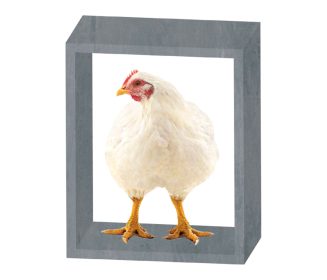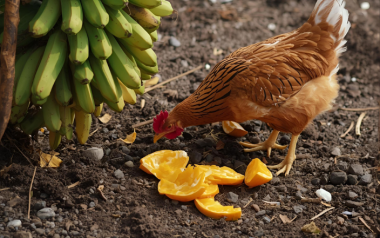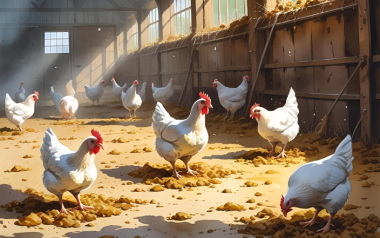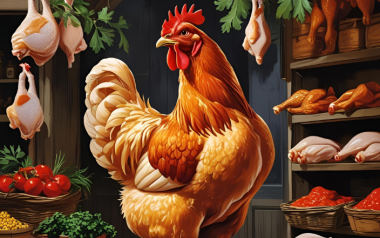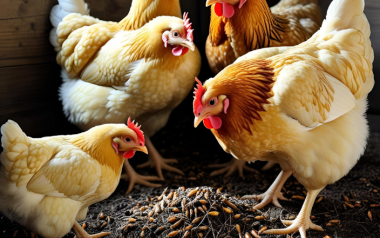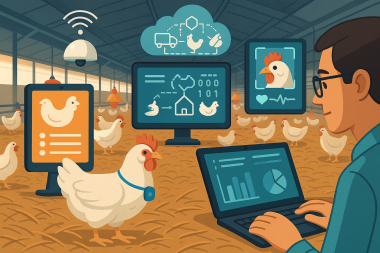
25 Apr 2025
From Coop to Cloud: Reinventing Poultry with Technology and Conscience
The poultry industry is undergoing a seismic shift. Once driven by manual labor, instinct, and experience, it is now embracing a revolution led by Artificial Intelligence (AI), Internet of Things (IoT), and Data Analytics.
In a quiet corner of a poultry farm in a village, a tiny wearable tag on a broiler chicken silently transmits health data to a cloud dashboard. A few kilometers away, a farm manager receives an alert on his phone—an unusual pattern in water intake could indicate early signs of coccidiosis. He takes action. No panic. No outbreak. No mass antibiotic use. This is not science fiction. This is the future of poultry—powered by technology, driven by data, and guided by ethics.
The Rise of Smart Poultry Farming
The poultry industry is undergoing a seismic shift. Once driven by manual labor, instinct, and experience, it is now embracing a revolution led by Artificial Intelligence (AI), Internet of Things (IoT), and Data Analytics.
Precision poultry farming is no longer a concept—it’s a reality. IoT sensors now monitor temperature, humidity, ammonia levels, and even detect movement anomalies in real-time. Automated feeding systems respond to a bird’s actual needs, not a fixed schedule. AI-powered cameras can recognize signs of stress, lameness, or aggression among birds, enabling early interventions that were once guesswork.
In hatcheries, AI models assess embryo viability by scanning egg movement and heat signatures. Smart hatchery platforms optimize temperature, humidity, and oxygen for each batch—boosting hatchability while minimizing waste.
In broiler farms, robots and drones are now helping in manure cleaning, surveillance, and feed delivery. These innovations are not just futuristic—they’re becoming essential for productivity, hygiene, and animal welfare.

Blockchain: The Trust Backbone
Continue after advertising.
Consumers today are not just buying meat—they’re buying a story. They want to know where it came from, what it was fed, how it was treated, and who raised it.
- Blockchain technology is becoming the backbone of farm-to-fork traceability.
- Every step of a bird’s life—from breeder farm, hatchery, feed, vaccinations, to processing—is digitally recorded.
- QR codes on packaging let consumers trace the journey of their chicken.
- For exporters, blockchain-based traceability opens gates to premium markets in Europe and the Middle East.
AI & Predictive Models: From Reactive to Proactive
AI is taking poultry farming from reactive to proactive. Machine learning models predict:
- Feed conversion efficiency
- Disease outbreaks based on weather and environmental data
- Growth curves and expected weights for optimized sales
Voice recognition tools are being trained to detect distress calls among chickens, offering insights into unseen suffering.
The result – Better bird welfare, reduced feed cost, fewer losses and a massive boost to economic and ethical sustainability.
Beyond Profit: The Ethics Question
Yet, amidst all the tech optimism, one pressing question remains:
Can we build a poultry industry that’s not just efficient—but also ethical?
- Yes—but it requires intentional design, not accidental evolution.
Animal Welfare Must Be Integral, Not Optional
- Technology can ensure birds are not overcrowded, injured, or stressed.
- But it must be programmed with humane thresholds, not just profit-maximizing formulas.
- Sensors should detect and alert on distress—not just performance deviations.
Empowering Workers and Farmers
The same AI that helps optimize operations must also help bridge the power imbalance in contract farming. Transparency in data can enable fairer profit-sharing models. Blockchain can ensure farmers aren’t exploited with hidden clauses or delayed payments.
Workers too, often the invisible cogs of the poultry machine, deserve safe working conditions, digital training, and fair wages. Robots may reduce drudgery, but they must not be an excuse to neglect the human workforce.
Environmentally Conscious Choices
Data-driven decision-making can reduce water usage, minimize antibiotic overuse, and help adopt sustainable feed alternatives. We must design systems where efficiency goes hand-in-hand with ecological responsibility.
Inclusion Over Disruption
Tech should not widen the digital divide. We need affordable AI tools, mobile apps, and training modules for small and marginal farmers. Startups and agri-tech firms must collaborate with cooperatives and self-help groups to ensure inclusive tech adoption.
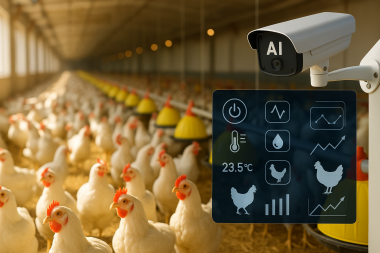
The Road Ahead: A Shared Vision
The opportunity is clear—technology can unlock growth, transparency, and traceability. But the true test lies in balancing productivity with compassion.
An ethical, tech-powered poultry industry is not just possible—it’s inevitable, if we make the right choices today. It’s a future where:
- Birds live better.
- Farmers earn more.
- Consumers eat with confidence.
- And technology serves both profit and purpose.
It’s time to reimagine poultry not just as a business, but as a beacon of ethical, inclusive, and intelligent agriculture.
Sources: Available upon request







